Asia
Kabul catwalk: Young Afghans seek model profession
TO SEE VIDEO:
- 3 hours ago
- Asia
Dozens of aspiring models are being signed up in a new initiative aiming to bring more Afghan faces to the country's advertising and TV industry, reports BBC Persian's Kawoon Khamoosh in Kabul.
In a modern office in western Kabul, dozens of handsome, carefully groomed young men are queuing patiently. The well-fitted suits and Western hair styles wouldn't be out of place in a fashion show.
And that's where many of them would like to be.
More than 300 young men and women have come to a photo studio in the Gawhar shopping mall to register with the new Kabul Modelling Club and Management, the first ever such initiative in Afghanistan.
All are amateurs with an ambition to follow in the steps of the world's big modelling stars and become professional.
"My role model is Italian fashion designer Roberto Cavalli," one of the hopefuls, Mohammad Fayaz, told me. "I have been inspired by his style."
He says it's tough to try and be a fashion model in Afghanistan because of the economic and security problems.
"But because I'm passionate about modelling, I've come to have a go. Luckily things are getting better and we have more freedoms to follow our interests than in the past."
After a recruitment drive through social media, Fayaz and his fellow models now go through a three-day casting process which includes a professional photo shoot.
Each participants registers personal details like age, weight and eye colour.
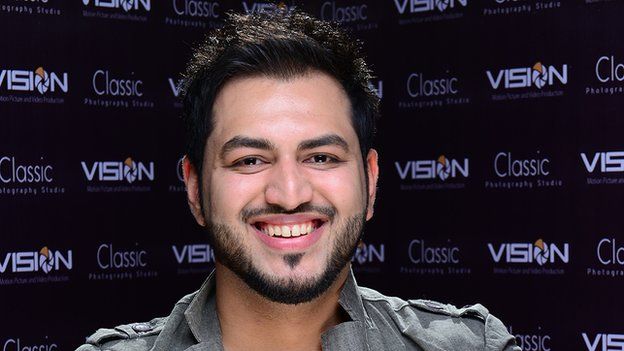
New faces
The organisers of the initiative are two Kabul media companies, the Classic Studio of Photography and Vision Media Production.
They say the aim is to bring together all amateur and professional models under one umbrella and produce a directory of Afghan models for the industry to use.
"We decided to bring together everyone who is interested in modelling and wants to appear on TV, in advertisements, magazines, on billboards and even in movies," Edris Salehi, one of the organisers, says.
The idea was born from after an international investment company declined to use existing Afghan models because the same faces appeared in different advertisements again and again.
Some production companies have used foreign actors to get around the limited choice.
In several TV adverts made in Pakistan and running on Afghan channels, you can watch foreign men and women whose voices have been dubbed with local languages for the Afghan audience.
Afghan production companies were unable to come up with new faces to re-version the advert for the Afghan market.
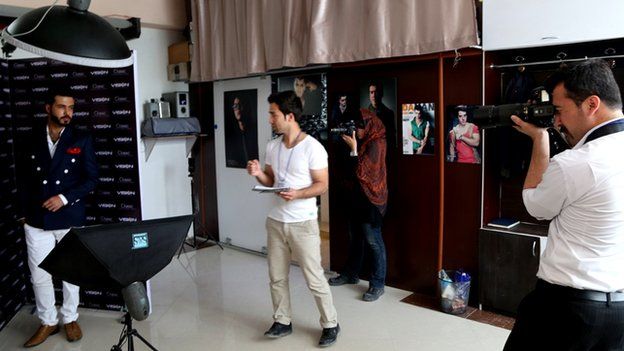
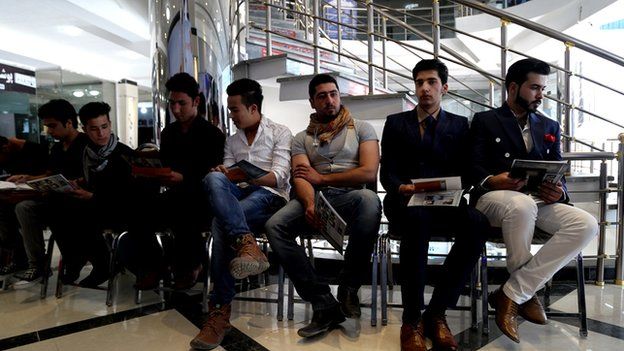
Fashion trend
Just 13 years ago, young men were unable to were the kind of outfits on show here.
The Taliban enforced a strict dress code of traditional clothes (Pirahan-Tunban) and even youngsters were not allowed to style their hair or beards.
Short hair, long beards, a white cap and turban where the norm.
All that has changed and today there are numerous shopping malls in Kabul offering Western clothing brands.
Shop windows feature short-sleeved ladies dresses which women wear at private parties and indoor, female-only wedding ceremonies.
Men, too, ask for Western brands and while in most parts of the country the burka and traditional dress is the norm, in the centre of Kabul you find girls and boys with modern dress and style.
But despite the changes, conservative traditions still set strict limits for any aspiring fashion model, especially women.
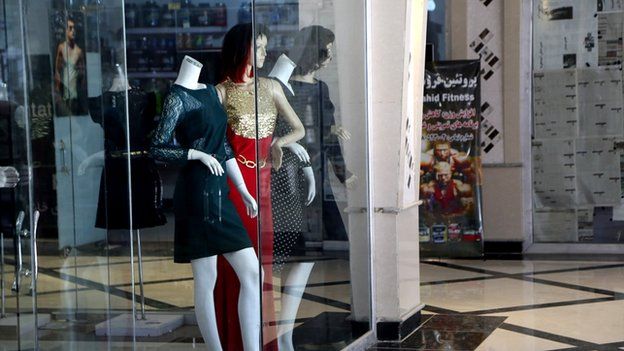
Red Lines
Only a few young women turned up for the fashion shoot and all declined to talk to me.
Women appearing on TV is a red line for many families, never mind modelling, despite the presence of many female television anchors on various stations.
It's a problem for producers and directors who often have to opt for Iranian, Pakistani and Tajik actors and models.
"Afghan actors and actresses are not flexible with roles," says Roya Sadat, the owner of Roya Film House, who has years of experience in Afghan movies, TV series and video shoots.
She says that the most difficult part of filming is casting, especially casting for female roles.
"When we want to cast actresses, sometimes they read the script, and when they find a scene unusual, they refuse to take part," Roya Sadat says.
"Unusual" refers to scenes which may upset conservative audiences.
"In one of my TV series there was a scene where I showed a husband and wife at bed time," Roya recalls.
She says that, knowing the sensitivities, they decided to turn the lights off in the scene as soon as the couple lay down.
But it still was too much for some, Roya says:
"When the series was broadcast, the actress called me and said that she was beaten by her family, who wanted to know what had happened when the lights went off!"
Roya says that despite such incidents, there's been much change over the past decade and things are getting easier for models and actors.
Aspiring models like Fayaz hope to use these new freedoms.
He says he hopes that the new modelling register will open up opportunities and establish a professional industry in Afghanistan.
"There are many aspiring models like me in Kabul and in other provinces of the country," Fayaz says: "But we are not organised, so having a professional agency will bring us all together so we can become more established."
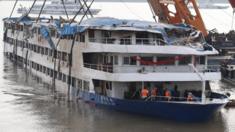
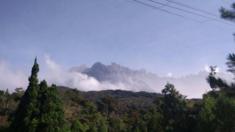







No comments:
Post a Comment
Please leave a comment-- or suggestions, particularly of topics and places you'd like to see covered